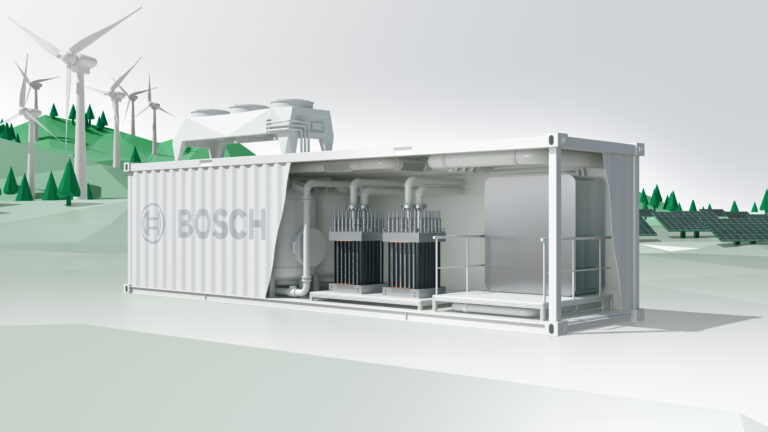
- Kim Kisner
- Business
- 02/18/2025
Potential Solution for Reducing Carbon Emissions

Hydrogen technology is gaining attention as a potential solution for reducing carbon emissions and supporting clean energy initiatives. Bosch is expanding its research and development efforts in Michigan with a new hydrogen hub, supported by the Michigan Business Development Program. The project focuses on advancing fuel cell and hydrogen engine technology, with applications in transportation and other industries.
SBN Detroit asked Matt Thorington, Engineering Manager of Hydrogen Stacks and Systems at Bosch USA, about the company’s vision for hydrogen, the impact of its new hydrogen hub, and the role Michigan plays in driving clean energy innovation.

Q: Regarding Bosch’s commitment to advance hydrogen technology – what drives this investment, and what are the ultimate goals of the hydrogen hub?
A: Hydrogen will play a role in a diversified mix of powertrain options in the future. Hydrogen is used in many other sectors, all of which, including mobility, will benefit from clean hydrogen production via water electrolysis. Our work at the Farmington Hills location underscores our commitment to advancing hydrogen technology, enabling us to deliver innovative solutions that support our customers’ needs and drive progress toward the hydrogen economy.
Q: Given the Michigan Business Development Program grant, how important is the state’s support in facilitating innovation and expanding clean energy infrastructure?
A: The addition of this hydrogen research and development space will help empower innovative developments throughout the hydrogen lifecycle, allowing for improved integration. This $13.7 million Michigan Business Development Program grant will enable extensive upgrades and restructuring of 2,200 square feet of existing space to support further development of the Proton Exchange Membrane (PEM) fuel cell power module and the Proton Exchange Membrane electrolyzer stack for hydrogen production.
Q: Bosch has identified hydrogen as a key part of a diversified powertrain future. How exactly will the hub facilitate and support this?
A: Fuel cells are highly efficient at converting hydrogen into electricity, and when powered by green hydrogen (produced via renewable energy), fuel cell electric vehicles offer a sustainable transportation solution with a low environmental footprint. With the fuel cell, Bosch is offering a solution – especially for long-haul trucks. Fuel cells have attained the technological maturity required for broad-based use, initially in commercial trucking.
Q: What specific sustainability challenges does this hydrogen hub aim to address, both locally in Michigan and globally?
A: Fuel cell vehicles produce only water vapor as a byproduct, making them a clean alternative to traditional internal combustion engine vehicles and contributing to improved air quality and reduced greenhouse gas emissions. Another bonus: fuel cell vehicles can be refueled in just a few minutes at hydrogen stations, offering refueling convenience similar to conventional vehicles. They also provide longer driving ranges compared to many battery electric vehicles, making them ideal for long-distance travel, thereby enabling the possibility to help decarbonize the ‘hard to abate’ sectors such as HD mobility, industrial, and power sectors.
For applications that run for a long time at high loads, a hydrogen engine is an attractive solution that helps to enable decarbonization while largely maintaining the existing powertrain. Bosch is developing injection and ignition systems for both port fuel and direct injection of hydrogen, designed to enable OEMs to utilize approximately 90% of the existing engine and vehicle architecture, and quickly adopt the hardware to hydrogen fuel. The success of fuel cell technology and hydrogen engine technology is further buoyed by the hydrogen hubs in the U.S.. More applications will help these technologies to establish a foothold in key initial markets.
Q: How will this project contribute to Michigan’s role in clean energy and hydrogen development?
A: Hydrogen offers immense potential as a low-carbon fuel that can reduce greenhouse gas emissions, improve energy security, and drive economic growth. I’m thankful that the State of Michigan continues to invest in clean energy and hydrogen development.
Q: What impact on jobs will this new hydrogen hub have?
A: The Regional Hydrogen Research and Development Hub at Bosch’s Farmington Hills headquarters facility is anticipated to create 28 new jobs in mechanical, electrical and chemical engineering over a three-year period.
Q: What are Bosch’s next steps in hydrogen innovation, and could we see further expansions or additional hydrogen-focused projects in Michigan?
A: Fuel cell power modules are only the beginning for Bosch. Today’s engine and powertrain technologies, along with the corresponding vehicle architectures, provide a solid platform for the development of hydrogen engines, especially since a significant portion of existing development and manufacturing technologies can be re-utilized. The basic structure of the fuel, air, and exhaust system can be adopted from existing powertrain solutions.
A hydrogen engine can do everything a diesel engine does, but on top of that, it can contribute to improved air quality and reduced greenhouse gas emissions. Although its efficiency is lower than that of a fuel cell when loads are light to moderate, it is more efficient for full loads.
Be sure to subscribe to our newsletter for regular updates on sustainable business practices in and around Detroit.
Kim Kisner
- All
- Business
- Community
- Education
- Events

Unique Monique Scented Candles, a Detroit-based business founded by Monique Bounds., aims to produce candles and household products with clean ingredients and local supply chains. What began as a personal hobby during college has evolved into a full-time venture producing coconut oil and soy-based candles made with essential oils and locally sourced materials. SBN Detroit interviewed Bounds about launching a sustainable product line, sourcing challenges in Michigan, and...

Eastern Market Partnership, in collaboration with the City of Detroit’s Office of Sustainability Urban Agriculture Division, has announced $240,000 in grant funding to support Detroit-based farmers and farmer collectives. The grants will advance food access, climate education, sustainable land use, and economic opportunity, with priority given to Black- and Indigenous-led farms, youth-led initiatives, and projects rooted in historically disinvested neighborhoods. The recipients – ranging from cooperatives and community...

Citizen Robotics is a Detroit-based nonprofit that advances the use of robotics and digital manufacturing in residential construction, focusing on improving productivity, sustainability, and long-term affordability. Best known for its early work in 3D-printed housing, it explores how alternative construction methods and new financial models can reduce material waste, lower lifetime operating costs, and enhance the resilience of homes. SBN Detroit interviewed Tom Woodman, founder and president of...







